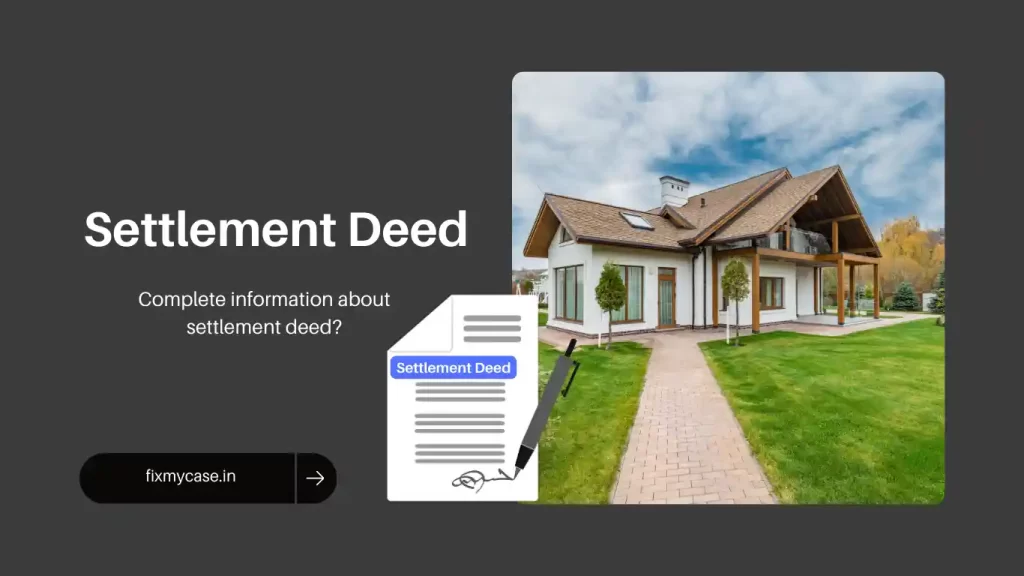What is a settlement deed?
A settlement deed, also known as a family settlement deed, is a legal document used to resolve disputes among family members and determine the division or distribution of movable or immovable properties. It is a written agreement that outlines the terms and conditions agreed upon by the parties involved, intending to avoid future conflicts or litigation.
The settlement deed is governed by the Indian Registration Act, 1908, which mandates the compulsory registration of such deeds to make them enforceable and valid. The registration process is governed by the rules outlined in the State Registration Acts and associated regulations.
In terms of court jurisdiction, the settlement deed can be enforced in the appropriate civil court, based on the value or nature of the property involved. The jurisdiction will be determined by the provisions of the Code of Civil Procedure, 1908, which outlines the jurisdictional limits for different levels of courts.

Important information about settlement deed.
A settlement deed, also known as a family settlement deed, is a legal document executed amongst family members to resolve disputes and conflicts regarding the distribution of the family’s assets. It is an agreement that determines the division of movable and immovable properties among the concerned parties.
Here is some comprehensive information about settlement deeds in India:
- Purpose: The primary purpose of a settlement deed is to bring about an amicable settlement of disputes and avoid potential litigation among family members. It aims to establish clear ownership and division of assets, such as land, buildings, bank accounts, stocks, etc., among the family members.
- Parties involved: Settlement deeds typically involve family members, such as siblings, parents, and children. The parties to the settlement deed may include those who have a legal claim to the assets in question.
- Key components: A typical settlement deed contains essential information, including the names and addresses of the involved parties, a description of the assets being divided, the terms of distribution, the share of each party, and any other specific provisions agreed upon by the parties, such as the payment of outstanding debts, maintenance to be provided, or any other relevant conditions.
- Registration: As per the Indian Registration Act, 1908, a settlement deed must be registered to be legally valid and enforceable. Registration involves the execution of the document before the Sub-Registrar of the relevant jurisdiction, paying the necessary stamp duty, and obtaining an official registration number. The registration process ensures the authenticity and legality of the settlement deed.
- Stamp duty: Stamp duty is calculated based on the value of the assets being divided. Each state in India has its own stamp duty regulations, and it is important to refer to the respective State Stamp Act to determine the applicable stamp duty rates for the execution of a settlement deed.
- Court jurisdiction: For disputes arising from settlement deeds, the civil court with jurisdiction over the area where the immovable property is located has the authority to hear and decide such matters. The jurisdiction may vary depending on the value or nature of the property involved, as outlined in the Code of Civil Procedure, 1908.
It is crucial to consult with a legal professional to ensure the settlement deed is drafted correctly, adhering to legal requirements and protecting the interests of all parties involved. This information serves as a general guide, and specific advice must be sought in accordance with the individual circumstances.
Need to register settlement deed?
Yes, it is essential to register a settlement deed in order to make it legally valid and enforceable. The registration of a settlement deed is governed by the Indian Registration Act, 1908. Section 17 of the Act mandates the registration of certain types of documents, including settlement deeds, to provide authenticity, prevent fraud, and establish legal rights.
The process of registration involves the following steps:
- Drafting the deed: A settlement deed should be drafted with the assistance of a legal professional, outlining the terms and conditions agreed upon by the parties involved.
- Stamp duty payment: Stamp duty is payable on the settlement deed, and the amount varies depending on the value of the assets involved and the applicable rates prescribed by the respective state’s Stamp Act. The stamp duty must be paid as per the provisions of the stamp duty laws to proceed with the registration.
- Submission to the registrar: The settlement deed, along with the required stamp duty payment and other necessary documents, needs to be submitted to the concerned Sub-Registrar’s office within the jurisdiction where the property is situated.
- Verification and registration: The Sub-Registrar verifies the documents, ensuring they comply with the legal requirements. If everything is found to be in order, the deed is registered by entering it into the official records maintained by the Sub-Registrar. Once registered, the deed becomes a legal and binding document.
- Obtaining registration number: Upon successful registration, the Sub-Registrar provides a registration number, endorsement, and seal on the registered document. These serve as proof of registration and authenticity.
It is important to note that the registration of a settlement deed provides legal weight to the document and protects the interests of the parties involved. Without registration, a settlement deed may not be admissible as evidence in court and may not have legal enforceability.
As the registration process and requirements may vary across states in India, it is advisable to consult with a legal professional or visit the concerned Sub-Registrar’s office to understand the specific procedures and regulations applicable in your area.
